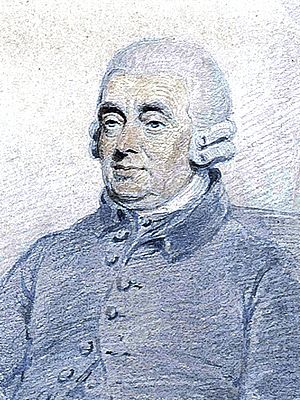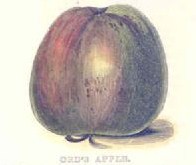John Ord facts for kids

John Ord (1729–1814) was an important English barrister and politician. A barrister is a type of lawyer who speaks in court. As a politician, he worked in the government. He was a member of the House of Commons from 1774 to 1790. The House of Commons is a main part of the British Parliament, where laws are made.
The Life of John Ord
John Ord was born in 1729. His parents were Robert Ord and Mary Darnell. He went to school at Newcome's School in Hackney. Later, he studied at Trinity College, Cambridge, a famous university. He finished his studies in 1750.
John Ord's Career in Law and Politics
After university, John Ord became a barrister. He trained at Lincoln's Inn, which is one of the places where lawyers are trained in London. In 1777, he became the Attorney-General of the Duchy of Lancaster. This was an important legal job for a special area of England.
In 1778, he became a Master in Chancery. This meant he helped with legal cases in a special court called the Court of Chancery. John Ord also wanted to be a Member of Parliament (MP). He tried to get elected for Morpeth in 1761 but did not win.
However, he later became an MP for other areas. He represented Midhurst, Hastings, and Wendover. He served as an MP from 1774 to 1790. During this time, he was also the chairman of ways and means in the House of Commons. This was a key role in managing how the government spent money.
John Ord's Amazing Garden
John Ord was also famous for his beautiful garden. It was located at Purser's Cross near Fulham in London. He started creating this garden in 1756. He grew many unusual and exotic trees there.
One special plant from his garden was a type of apple called "Ord's Apple." This apple was grown by his sister-in-law, Anne Simpson. It was also known as "Simpson's Pippin" or "Simpson's Seedling." This new apple came from the seeds of another well-known apple, the Newtown Pippin.
John Ord loved plants and gardening. He was a member of the Horticultural Society. This group helps people learn about growing plants. In 1780, he also became a Fellow of the Royal Society. This is a very old and respected group for scientists.
John Ord passed away on June 6, 1814. He was buried in the churchyard at Fulham.
 | Jessica Watkins |
 | Robert Henry Lawrence Jr. |
 | Mae Jemison |
 | Sian Proctor |
 | Guion Bluford |


